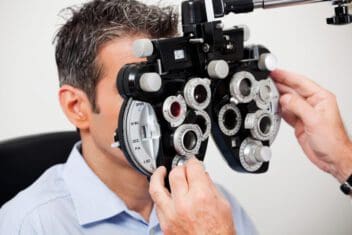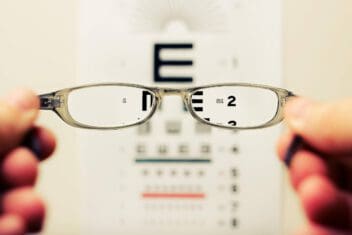Last Updated
Further Reading
- Myths
- History of LASIK
- How Does it Work?
- For Police
- LASIK Disqualifications
- LASIK Surgery On Both Eyes
- LASIK and Corneal Thickness
- Computer Use Guidelines After LASIK
- Halos After LASIK
- 7 Ways to Prevent and Reduce Pain After LASIK Surgery
- Can You Get a Driver’s License if You Have Had LASIK?
- LASIK Side Effects
- Recovery Timelines and Tips
- Contacts and Glasses After LASIK?
- Does it Hurt or Cause Pain?
- Alternatives and Comparisons
- Success Rates and Safety
- Pros and Cons
- Are You Awake During Lasik?
- When Is LASIK Enhancement Needed?
- Are You Eligible?
- Can You Watch TV?
- Can It Cause Blindness?
- Are There Age Limits?
- Long-Term Effects
- Post-Surgery Eye Care
- Can You Get it Twice?
- Is LASIK Safe?
Can Your Vision Be Too Bad for LASIK?
Last Updated
Table of Contents
Yes, your vision can be potentially too bad for LASIK.
LASIK is available to a variety of patients, but patients will generally qualify for treatment if their vision falls between -0.5 D to -8.0 D myopia. The maximum prescription for treatment for patients with moderate to severe myopia is around -8.0 D.
Patients interested in pursuing LASIK refractive surgery who fall on the higher ends of severe myopia must have thick and healthy corneas. Treatment for individuals with higher prescriptions generally requires the removal of more corneal tissue. If a person with high myopia has thin corneas, they are likely not a candidate for LASIK.
Do Outcomes Change Based on One’s Starting Prescription?
To qualify for LASIK eye surgery, patients must have a stable prescription, preferably for at least one year prior to treatment. But ideally, the eyeglasses prescription will not have changed for at least two consecutive years prior to undergoing surgery.

To determine if your prescription falls within the treatable range, consult with a LASIK surgeon. They will examine your eyes, take measurements, inquire about your medical history, and determine your candidacy for the surgery.
Currently, laser vision correction profiles can treat up to +6.00 diopters of hyperopia, astigmatism up to 6 diopters, and nearsightedness up to -12.00 diopters.
What Prescription is Too High for LASIK?
While LASIK surgery can correct a wide range of refractive errors, there is a limitation on how high a prescription can be treated. Here’s a breakdown of what qualifies and what might be too high:
- Myopia (Nearsightedness): LASIK is generally available for patients with a prescription ranging from -0.5 D to -8.0 D. However, some current laser vision correction profiles can potentially treat nearsightedness up to -12.00 diopters, depending on individual circumstances.
- Hyperopia (Farsightedness): The treatment range for hyperopia is up to +6.00 diopters.
- Astigmatism: LASIK can treat astigmatism up to 6 diopters.
Patients falling outside these ranges, especially those with severe myopia, must meet additional criteria to be considered for LASIK. The corneas must be thick and healthy, as a higher prescription requires the removal of more corneal tissue. Thin corneas may disqualify a patient, even if they have a treatable prescription.
Who Cannot Get LASIK?
Eligibility for LASIK surgery depends on current eye condition, overall health, and behavioral and environmental factors.
For instance, some vocations might prohibit refractive procedures. It’s important to check with an eye care specialist as well as with your employer before exploring LASIK treatment.

If you have changed your prescription on your glasses or contact lenses within the past one to two years, you may not be a candidate for LASIK. Individuals with certain autoimmune disorders or eye dryness may also not be candidates for LASIK surgery.
Patients who are younger than 18 are not viable candidates for LASIK. Individuals who have certain health conditions that affect healing ability are most likely also not considered viable candidates.
Requirements for LASIK Eye Surgery
A good candidate for LASIK surgery will be at least 18 years old and have healthy corneas. Viable candidates will have a stable prescription and at least 20/40 vision when wearing glasses or contact lenses.
A good health profile and not having any active eye diseases will improve your chances of being a good candidate for LASIK.
At the end of the day, candidacy should be determined by an ophthalmologist who will be performing the surgery. If you are not a candidate for LASIK, you can discuss alternative procedures that may work better for your situation.
How to Learn if You Are a Candidate for LASIK

The only way to know for certain if you are a candidate for LASIK eye surgery is to consult with an experienced and reputable surgeon. Your surgeon will give you an eye examination, take measurements, and determine your candidacy. This is generally done during a LASIK consultation.
LASIK surgery comes with a high success rate and a high patient satisfaction rate, but success is more likely if you are a good candidate for the surgery. Be honest about your medical history and eye health during your consultation. Transparency will help you to get the best results from any eye procedures.
References
- Comparison Between Surgical Outcomes of LASIK With and Without Laser Asymmetric Keratectomy to Avoid Conventional Laser Refractive Surgery Adverse Effects. (June 2020). Scientific Reports.
- LASIK Surgery. (November 2020). Voices in Bioethics.
- Functional Outcome and Patient Satisfaction After Laser In Situ Keratomileusis for Correction of Myopia and Myopic Astigmatism. (January 2015). Middle East African Journal of Ophthalmology.
- How to Determine an Ideal LASIK Candidate. (April 2019). Optometry Times.
- High Myopia as a Risk Factor for Post-LASIK Ectasia: A Case Report. (February 2019). Digital Journal of Ophthalmology.
- Clinical Outcomes After Small-Incision Lenticule Extraction Versus Femtosecond Laser-Assisted LASIK for High Myopia: A Meta-Analysis. (February 2021). PLOS ONE.
The information provided on this page should not be used in place of information provided by a doctor or specialist. To learn more, read our Privacy Policy and Editorial Policy pages.
Further Reading
- Myths
- History of LASIK
- How Does it Work?
- For Police
- LASIK Disqualifications
- LASIK Surgery On Both Eyes
- LASIK and Corneal Thickness
- Computer Use Guidelines After LASIK
- Halos After LASIK
- 7 Ways to Prevent and Reduce Pain After LASIK Surgery
- Can You Get a Driver’s License if You Have Had LASIK?
- LASIK Side Effects
- Recovery Timelines and Tips
- Contacts and Glasses After LASIK?
- Does it Hurt or Cause Pain?
- Alternatives and Comparisons
- Success Rates and Safety
- Pros and Cons
- Are You Awake During Lasik?
- When Is LASIK Enhancement Needed?
- Are You Eligible?
- Can You Watch TV?
- Can It Cause Blindness?
- Are There Age Limits?
- Long-Term Effects
- Post-Surgery Eye Care
- Can You Get it Twice?
- Is LASIK Safe?